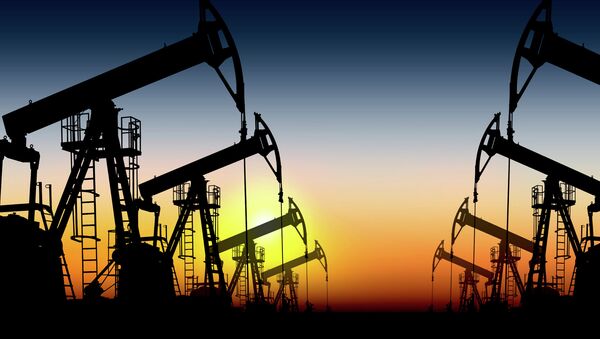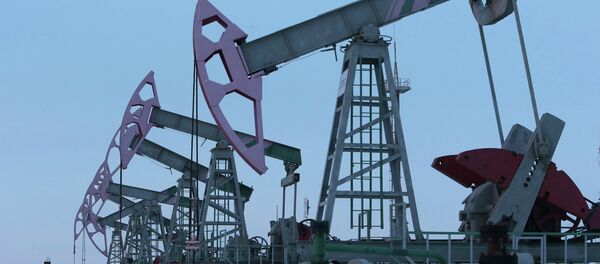Kristian Rouz – Wall Street ended Monday’s trades in the red Monday due to several factors curbing investors’ appetite for risk and fueling bearish sentiment. First, last week’s optimistic US employment data spurred speculations over the possible increase in the Federal Reserve’s interest rate, which, if happens sooner than expected, will render money liquidity possibly more valuable than equities in some cases.
The Dow Jones Index retreated 0.53%, the S&P 500 slid 0.42% and the Nasdaq lost 0.39%. Within S&P, nine sectors slipped, utilities and healthcare being the weakest performers, while only the energy sector posted some gains, as stabilized oil prices boosted a buyout in drillers’ and refiners’ equities. A minor factor also weighing on the US stocks is their possible over-valuation across some sectors.
"Utilities are trading at very expensive valuations historically, with little earnings and revenue growth," Michael O'Rourke of the Greenwich, CT-based JonesTrading told Reuters.
Greece’s new PM, the left-wing radical Alexis Tsipras, have recently made several harsh anti-austerity comments. Austerity is the cornerstone of the Eurozone’s strategy of economic recovery, and is advocated by the nations of Northern Europe, primarily Germany, which also is the biggest European economy and the most influential played on the continent. By making his controversial remarks of WWII reparations, Tsipras has put Greece on the brink of being kicked out of the Eurozone, rendering investors nervous over the future valuation in the European assets.
In China, exports slumped 3.3% year-on-year, meaning the nation, not so long ago known as “the world’s manufacture”, is losing its competitive edge in international trade of industrial goods.
"With an emergency meeting concerning the situation in Greece by the eurozone only two days away, chances appear rather slim for a compromise, which heightens the risk of a possible Greek default and exit out of the euro in just a few months from now," Markus Huber of the Peregrine & Black trading firm said.
In Greece, the stock market dropped 5% as the 240 bln euro bailout for Greece is at risk now, with the Germans demanding that Athens show willingness to undertake a full-scale reform. German FM Wolfgang Schauble said that "if they want our help, there needs to be a programme" of cooperation with the ECB-IMF-EU ‘troika’ of creditors.
"As all eyes are turning to the upcoming extraordinary Eurogroup meeting on Wednesday, we could expect high volatility across equity and commodity markets as European leaders are likely to urge governments to do all they can in order to prevent the Greek debt crisis from escalating and getting out of control," Myrto Sokou of Sucden Financial said.
Investors worldwide are speaking of the “Grexit” – the prospect of Greece leaving the Eurozone soon. However, Asian investors are more concerned with the situation in China, where stock markets are feverish, while the economy’s overall performance is poor. This situation is specifically alarming as speculative bubbles are even more dangerous in a weaker non-financial environment. To add more to the existing concerns, the Chinese authorities have recently conducted several executions of the nation’s billionaires.
“Mr. Xi (China’s leader) has launched the most aggressive anti-corruption drive ever seen in Communist China”, the Financial Times note, adding the egalitarian and anti-elitist drive in Beijing might be a sign the the Communist party wants to reaffirm the strength of its grip on the reins of power amidst economic turmoil.
Besides, China’s debt-to-GDP ratio exceed 200% in the recent five years, standing at the figure of some $28 trillion, far above the US national debt of “just” $18 trillion.
Some observers say that a switch to a domestic consumption-driven model of growth might save the situation in China’s economy, however, such a switch would require a comprehensive structural reform. The Communist party might lose its dominance in the nation’s political sphere, which is seen as unacceptable in Beijing. Meanwhile, the challenges China is facing are similar to those of Russia: the old growth model does not work anymore, the FX reserves are thinning, while the reform agenda is lacking political willingness. A stalemate?
Speaking of Russia, global crude prices have posted their best results since 2011 last week, supporting the rouble now at some 65 RUB per 1 dollar, and also driving Middle Eastern stocks up. On Sunday, 8th February, equities in Saudi Arabia advanced with Tadawul Index adding 1.8%. Abu Dhabi’s ADX Index rose 0.3% and the QE Index in Qatar advanced 0.8%, extending gains into their sixth day straight.
Oil prices rose as US drillers decommissioned 94 wells in late January in order to support their market valuation. Consequently, international oil giants, including BP, Statioil and Royal Dutch Shell, reduced their investment in drilling, prompting markets to think they would extract less oil.
However, in New York, Citigroup said oil prices might soon slump to as little as $20/bbl, inflicting a mortal wound to OPEC. This might happen because oil production in the US is still on the rise, besides, the feature of shale oil drilling is that you could pull a rig off the field and then re-commission it again in almost no time, rendering the recent rebound in oil prices unsustainable. Brazil and Russia pumping record volumes of oil in desperate attempts to fill their thinning budgets with fading petrodollars. This means the oversupply of oil is still a factor, dragging prices down.
"It looks exceedingly unlikely for OPEC to return to its old way of doing business. While many analysts have seen in past market crises 'the end of OPEC,' this time around might well be different," Citigroup said.
Brent crude will cost $54/bbl on average this year, Citi said, while a sharp plunge to $20 is a possibility, while true effects of disinvestment will show in Q4, driving oil prices up to some $75/bbl.





